Piano Services Featured in This Gallery:
|
All images in our Piano Services Gallery can be enlarged by clicking on
the image.
Fine Pianos of Note From Around the World
Mason and Hamlin,
Bösendorfer, Baldwin, Schimmel, Bluthner, and More...
|
Mason & Hamlin Pianos - Classic Hand-made American Grand Pianos



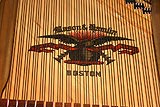
Above pictures show a classic Mason & Hamlin Model BB Grand Piano built during the golden era of piano building in 1928. These vintage Mason and Hamlin pianos are built in a similar manner of piano construction as Steinway Pianos are. The tone these pianos produce is both powerful and warm, with a very full sustain. They feature very heavy multi-laminate maple rims and pinblock structure, and full perimeter plate castings which are considered some of the heaviest in the industry.
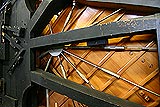
Unique to the Mason & Hamlin piano is the the patented Tension Resonator System (left). Sometimes called the "spider" under the soundboard, these steel bars are fixed into the rim and belly of the piano, which are all connected by a center "hub." These bars are tensioned at the factory to help retain the case structure of the piano, and in theory, help retain the crown of the soundboard. These bars are adjusted at the factory to a specific tension and should NEVER be adjusted in the field.
Mason & Hamlin Pianos are considered to be one of the best instruments ever produced. Its heavy construction, coupled with extraordinary craftsmanship, make this piano sought after by many pianists. This particular Model BB pictured was in our studio for internal restoration and was owned by the Academy Award winner and multiple nominee, the late Jerry Goldsmith.
|
Steinway Art Case Grand Piano - German Design


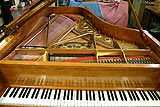
This extraordinary 1916 Hamburg German Steinway Model B Grand Piano came to our studio for an internal restoration and the installation of a Pianodisc I.Q. Player Piano System. It is representative of the Biedermeier style of furniture popular in northern Europe from circa 1825 – 1845. Surrounding the body of the case are intricate scenes, classic design, and exquisite marquetry. The incredible attention to detail and inlay throughout the entire cabinet of this instrument is a testament to the skill and craftsmanship of days gone by. It is truly one of a kind!


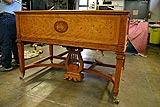
|
Bösendorfer Vienna - One of Only Two in North America



This Bösendorfer Vienna Model 200 Grand in an Amboyna veneer with inlays,
was in our studio for a Pianodisc installation. This
is one of only two in North America.
|
Bösendorfer - Porsche Designed Grand Piano



This Bösendorfer Grand designed by F.A. Porsche is another prime example of custom piano building. This sleek piano was in our studio for a Pianodisc installation. Note the use of silver coloring on the plate of the piano, and the unique control pedals on the lyre.
|
Schimmel Art Case Grand Piano


Not all pianos that come into our studio require complete rebuilding.
This Schimmel Art Case Grand Model 175 built in the 1980's, has spent
most of its' life in a house by the ocean, and showed signs of brass
and string corrosion. After a thorough cleaning, regulation, tuning
and voicing, the piano looked and played as new again!
|
A Beautiful Schimmel Plexiglas® Grand Piano With Lights


Here we see a Schimmel Model 213 in custom Plexiglas® cabinetry.
The piano is built with lights throughout the cabinetry that produce
a stunning result, especially in darkness. The light invisibly filters
directly across the Plexiglas® panels, and reflects around all the
ends. This particular piano is stellar example of custom piano building!
As a side benefit to the use of Plexiglas®, the piano actually has
enhanced tone because of the extremely solid and reflective properties
of the material. It is also amazingly HEAVY! This instrument was in
our facility for regulation, voicing, and the installation of a Pianodisc
Player Piano System.



|
Restoring a Wurlitzer Butterfly Baby Grand Piano
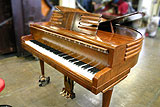



Here is a rare vintage Wurlitzer Butterfly Baby Grand built in 1938 which was brought to our studio for restringing, new Renner action components, and damper system repairs. Notice the Art-Deco styling of this unusual instrument. This well preserved piano was played extensively and provided years of service to the owner. After thorough repair and cleaning procedures, the piano played like new again. In fact, the playability and tone that was achieved far exceeded our expectations for such an unusually designed piano (see below).




There are some interesting internal features of the famous Wurlitzer Butterfly Grand Piano shown above. Notice the adjustment screw on the bridge between the first two tenor bass strings in the first two pictures on the far left. This screw adjusts pressure on a floating bar that is attached to the soundboard of the piano between the rim and a center point on the soundboard. As the note is played, pressure can be increased or decreased on this bar by turning the screw to achieve optimal tonal output. This is a brilliant design for such a small piano!
Due to this piano's very small keybed, the factory installed a torsion-bar type sustain pedal. Although it did function, it's very short design created a very heavy pedal with a horrible mushy feeling. The third picture from the left shows a redesign of this pedal with a new Young Chang sustain pedal component. The damper system now functions like a normal grand piano. We use this type of redesign on many of our piano restorations that have sub-standard pedal components installed from the factory.
The picture on the far right shows a side view of the compressed Wurlitzer Butterfly Grand action. Notice the unusual (although fully functional) wippen assembly. These parts are no longer available and must be hand made if lost or broken. Fortunately for this piano, all components were intact and functioning beautifully. More interesting still is the fitment of the hammers on the shanks. The hammer is hung on the shank at about 4½ inches. This is 5/8" shorter than most normal grand pianos. These new Renner components were modified at the hexagonal portion of the shank in order to properly hang the hammers. Rare and oddly designed pianos present numerous challenges that must be overcome in order to do a proper piano restoration.
|
The Steen Nielsen Hammerspinet Hybrid Piano




Here is a superb example of unique and complicated engineering. This Steen Nielsen Hammerspinet at first glance appears to be a harpsichord, but it is far from it. This instrument has many features we have never seen in a piano before. Each key has only one string per note from bass to treble, as well as having all the tuning pins on the rear side of the cabinet, where normally, you would have the hitch pins for the strings. Also, the action and damper lever assembly is entirely under the keys of the piano.





These pictures illustrate the action's basic function. A normal type jack is connected to the bottom of each key. The key end is connected to a bar as a pivot point and holds the key in position (there are no balance rail pins). As the key is depressed, a let-off button makes contact with a wooden rail, which then trips a pivoting hammershank towards the string. At the same time, another let-off type button depresses the back of a damper lever in the horizontal position, lifting it off the string to allow the note to sound. The weight of the action is adjusted by a screw under the rear of the key that is in contact with a spiral spring (no key leads are used). The height of each key at rest is controlled by a screw on the top of the key just behind the keytops, that comes in contact with a weighted wooden piece that is part of the piano's cabinetry. Keydip is controlled with a normal front rail adjustment.

This piano came to our studio on the request to "make it play" and "make the pedals work." The instrument was completely out of regulation (more than likely by someone who attempted repairs, but had no concept of how the instrument functioned). Also, pedal function was inoperative. After a basic study of the mechanics of the action, a regulation was performed. Pedal functions were restored in part by replacing the pivot points (left) with steel as opposed to the plastic parts which would bend under the tension of the pedals.
The tone of this piano is unique and similar to upright toy pianos we have worked on in the past. The playability, astoundingly, is quite good! There is good pianissimo to fortissimo control, and note repetition is consistent and quick... As far as we know, this piano is a Danish design.
|
Complete Action Restoration on 1918 Kurtzmann Upright




Here is a beautiful example of an early 20th Century, high quality upright grand piano. This piano had been used until all of the keytops had worn off, and the keystick material underneath was ground away. All of the original action components had been repaired numerous times, and suffered from cracks and wood rot. The solution was a set of completely new action components including hammers, shanks, butts, damper levers and heads, wippens, and wippen lifter assemblies. Also included was a brand new keyset reproduction that utilized an entirely new keyframe. This was a BIG, heavy piano, and the corresponding tone produced was just as astounding!
|
Restringing a Bluthner Patented "4th String" Grand Piano



This Bluthner was in need of restringing, and was rebuilt with original
felt color and blue tuning pins. Note Bluthner's patented "4th
String" in the two treble sections of the piano. This 4th string
is designed to vibrate sympathetically with the main
3 strings and add color and depth to the tone of the
piano. Approximately 1/2 of these 4th strings are tuned
exactly one octave higher than the 3 normal strings.
Also note the special bridge exclusively used for the
4th string in front of the main bridge (above center).
|
Steinert Pianos...Mastering the Art of Imitation


Here is a Steinert Grand Piano...a superb copy of the Steinway, and Mason and Hamlin grand pianos. The plate, stringing scales and construction methods of the body are all very similar to Steinway. The Wessell, Nickel and Gross action used is almost identical to Mason and Hamlin's design, albeit the wippen spring is the butterfly style used by Steinway, as opposed to Masons' screw-adjustable wippen spring. Even the damper tray is almost identical to Mason and Hamlin. It appears that the goal of the company was to incorporate the elements of two of the best made and well known pianos of the time, and create their own "hybrid" design.
These types of pianos usually do not stand the test of time as well as their brand name counterparts, but if proper restorative measures are performed, the likely results can be quite extraordinary.



|
Restringing a Vintage Mason and Hamlin Grand Piano


Here, Giovanni is restringing a Vintage Mason and Hamlin Grand Piano.
|
Predecessor to the Modern Grand Piano... the Square Grand Piano



Historically, these pianos are very important and well preserved versions
like this one should be maintained and well cared for. For the most
part, we believe these pianos should be used for historical performances
only. They are not appropriate for learning to "play the piano."
|
Piano Services Featured in This Gallery:
|
|
|